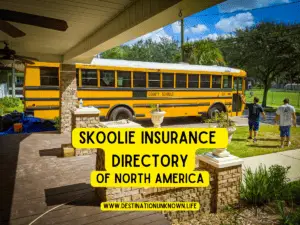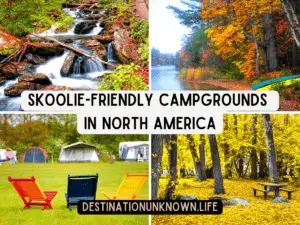Skoolie vs RV
In this article, we will go into some pros and cons between a
Additionally, we aren’t going to include items surrounding vehicle and home maintenance since these are needed in both vehicles and can vary widely depending on care and construction.
What drives you to purchase one of these vehicles is the adventure and freedom to explore it from the comforts of your own (moving) home. Whether you choose to purchase a more traditional RV or break out of the mold with a
We will not dive deep into the
- Can skoolies get insurance? Yes
- Can you live year-round in your skoolie? Yes
- Can you register your skoolie as an RV? Yes
- Can you get mail when you live in a skoolie or van? Yes
- Do you need a CDL to drive a skoolie? No
- Can skoolies park in national parks? Yes
- Can skoolies stay in RV parks? Yes
- Are skoolies legal to drive? Yes
- Are skoolies safe? Yes
- Can you find a builder to convert your school bus? Yes
What is a skoolie ?
A
What is a RV?
An RV is short for recreational vehicle. It is a broad name for liveable vehicles that are lived in usually part-time or seasonally, though many have taken to living in them year-round especially in more moderate climates in the south. Examples of RVs include pull-behind trailers like a fifth wheel and motorized vehicles like a Class A, B, or C motorhome or school bus conversion.
In North America, you will often hear the term RV used in lieu of motorhome, even for year-round vehicles though the name implies otherwise.
What is a motorhome?
A motorhome is a broad name for motorized homes. As the name implies, it describes a vehicle that carries a home. Examples of this may include school bus and van conversions, and Class A, B, and C recreational vehicles. The term motorhome is more commonly used outside of North America.
What are the Benefits of a Skoolie Compared to an RV?
Some benefits of a
Customization
If buying a completed rig, your
Affordability
Probably the biggest appeal to a
Sustainability
“Reduce, reuse and recycle” is a phrase we all know. All three apply when downsizing and recycling a retired school bus into some useful – giving something old a new purpose. That feels quite good.
Engine Longevity
Our retired school bus had about 150,000 miles on it, and every diesel mechanic spoke with said that made it only an adolescent (young) bus in terms of mileage. It’s not uncommon to see these buses going strong after 250,000+ miles with regular and recommended maintenance.
Body Longevity
A school bus frame, ribs, and body is made of steel to make it as safe as possible on the road in case of an accident.
Safety
School bus are build to transport children, and are manufactured with strict guidelines in place to make them as safe as possible. This was probably the number one reason why we choose to build a
Amenities
The available amenities to living in a
What are the Downsides of Skoolie Compared to an RV?
Some downsides to purchasing a skoolie are the length of time to complete a conversion, various types of construction small resale market if you decide to sell or buy, and no warranties on what you purchase.
Length of Time to Build
Unless you’re a professional tradesmen, you can expect a build with basic quality of life items such as plumbing (water, sewer, gray tanks, etc), electricity, and finer finishes such as kitchen, bedroom, and bathroom, to take you between 7 months to 2 years to complete with regular labor. If you’re hiring out or paying someone to convert your rig for you, there may be a waiting list and you are at the mercy of the tradesman’s schedule.
Small Resale Market
Plans change, so how will you sell off your rig if this isn’t the life for you any more? A private exchange will be your best option since most commercial dealers won’t know how to value your rig properly. That can mean many long months of talking with tire-kickers and low-ballers.
No Warranties
There is no governing body that regulates the building or design of skoolies, so each build will have a flair of its own. This disadvantage could also be an advantage too, because you may have a better understanding of the inner workings of your home then if you paid a lot more money on a Class A, and you don’t know how it was built.
No AC While Driving
There may be some work around to this, but our bus didn’t have great AC to begin with and the engine block is inside the bus, so it was quite warm while driving in hot climates, even with the windows open.
Loud While Driving
This may vary for vehicles that don’t have the engine block inside the rig; however, ours is located inside. That makes it very difficult to talk in a normal voice when driving because the diesel engine is very loud.
Is it Cheaper to Buy an RV or Convert a Bus?
It is cheaper to convert a bus than buy an RV, in most cases. The sticker prices of non-converted buses and even many fully converted buses are lower than the selling price of a new RV of the same size.
As an example, Thor Motor Coach sells gas 26’ motorhomes starting at $168,300. The cheapest 34’ diesel motorhome they sell starts at $344,250.
Our 34’ diesel school bus cost us about $50,000 to convert ourselves over 8 months. You can read our full budget here.
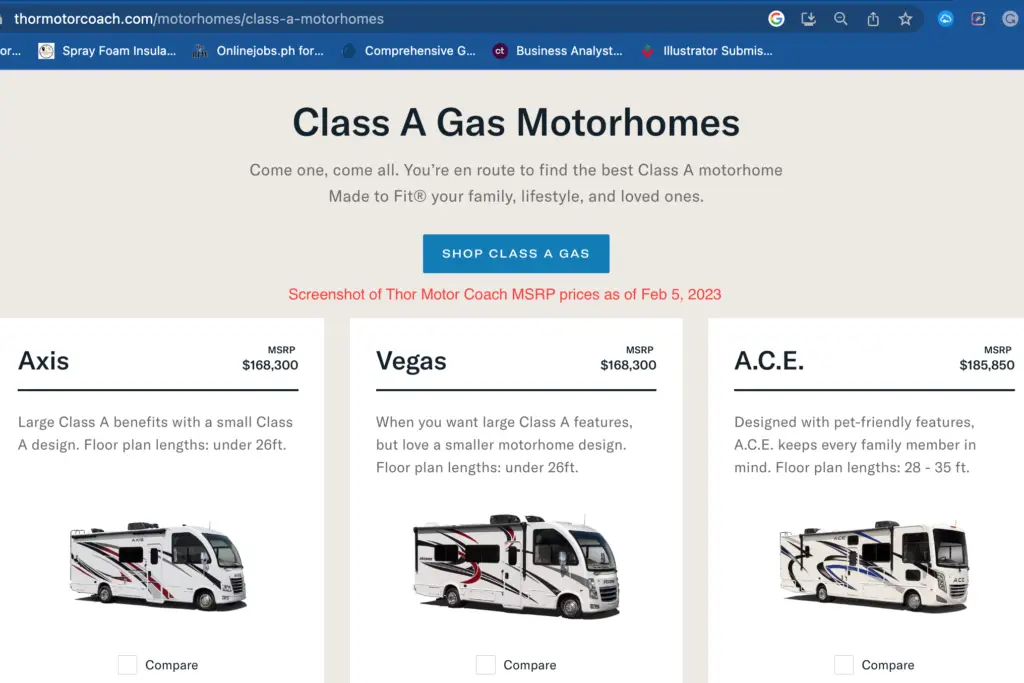
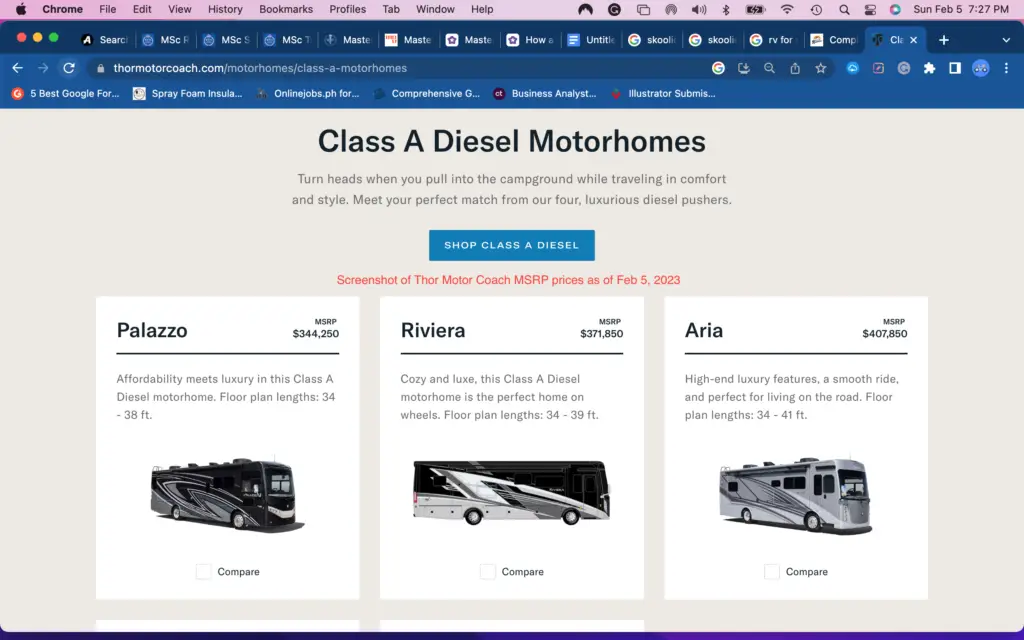
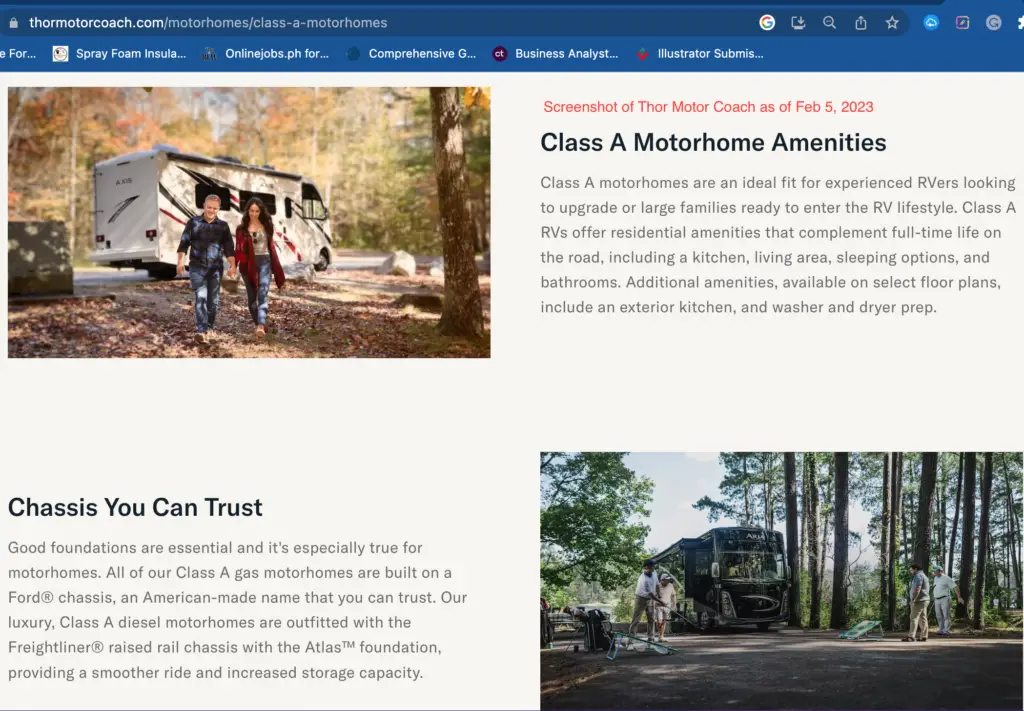
Is it better to live in a bus or an RV?
That’s a personal question and subjective depending on if you’re “team
Team Skoolie
In my personal opinion, we found that we loved living in our RV. My entire blog is dedicated to being pro
Below are some other resources supporting
Team RV
Below are some other resources supporting RV living:
Final notes
Which side are you on? Tell me in the comments!
We loved the freedom our
No matter which vehicle you chose to make your adventure in, just get out there and do it. You won’t regret it!
Read this blog if you want to learn more about buying a used school bus to convert.

